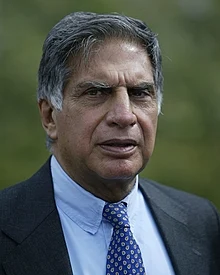
Table of Contents
Ratan Tata Biography: The Rise of Tata Group”.
Ratan Naval Tata (28 December 1937 – 9 October 2024) was an Indian industrialist and philanthropist. He served as the chairman of Tata Group and Tata Sons from 1991 to 2012 and interim chairman from October 2016 to February 2017. In 2008, he received the Padma Vibhushan, the second-highest civilian honor in India. Shri Ratan had previously received the Padma Bhushan, the third-highest civilian honor, in 2000.
1. Introduction
- Ratan Tata is a prominent Indian industrialist known for his leadership and philanthropy.
- He is the former chairman of Tata Sons, shaping the Tata Group into a global conglomerate.
- This blog covers Ratan Tata’s biography, contributions, and the history of the Tata Group.
2. Early Life and Education
- Date of Birth: December 28, 1937, in Mumbai, India.
- Family Background: Raised by his grandmother Lady Navajbai Tata after his parents’ separation.
- Education:
- Attended Cathedral and John Connon School, Mumbai.
- Studied architecture and structural engineering at Cornell University, USA.
- Completed the Advanced Management Program at Harvard Business School.
3. Beginning of Career at Tata Group
- Joined Tata Group: In 1962, started working at Tata Steel in Jamshedpur.
- Role and Experience: Worked on the shop floor, gaining hands-on experience in manufacturing.
- Respect Among Peers: Known for his humility and willingness to learn.
4. Rise to Leadership
- Chairman of Tata Sons: Took over as chairman in 1991, succeeding J.R.D. Tata.
- Challenges: Faced a changing economic environment with market liberalization in India.
- Vision: Focused on modernizing the Tata Group and global expansion.
5. Transforming Tata Group: Key Achievements
- Global Expansion:
- Tata Tea’s Acquisition of Tetley (2000): Made Tata one of the largest tea brands globally.
- Tata Motors Acquired Jaguar Land Rover (2008): Positioned Tata Motors as a global player.
- Tata Steel’s Acquisition of Corus (2007): Created the world’s fifth-largest steel producer.
- Innovation and Product Development:
- Launch of Tata Nano (2008): Developed the world’s most affordable car, aimed at mass-market accessibility.
- Introduction of Tata Indica (1998): India’s first passenger car developed by an Indian company.
- Diversification into New Sectors:
- Information Technology: TCS (Tata Consultancy Services) became a leader in the global IT sector.
- Telecommunications: Ventures into Tata Teleservices and Tata Sky established a strong presence in telecom.
6. Leadership Style and Philosophy
- Ethical Leadership: Emphasized values, integrity, and social responsibility.
- Employee Welfare: Prioritized the well-being of employees and customer satisfaction over profits.
- Personal Values:
- Known for his humility and compassion.
- Visited families of victims of the 26/11 Mumbai attacks without media attention.
7. Retirement and Interim Return
- Stepped Down in 2012: Passed the leadership to Cyrus Mistry.
- Return in 2016: Served as interim chairman after Mistry’s removal.
- Awards and Recognition: Received Padma Bhushan (2000) and Padma Vibhushan (2008) for his contributions.
8. The Tata Group: A Global Conglomerate
- Overview: Founded in 1868 by Jamsetji Tata, Tata Group operates in over 100 countries.
- Core Industries: Includes steel, automobiles, IT, communications, hospitality, and consumer goods.
- Iconic Brands:
- Tata Motors
- Tata Consultancy Services (TCS)
- Tata Steel
- Taj Hotels (under Indian Hotels Company Ltd.)
- Titan in luxury goods.
9. Philanthropy and Social Responsibility
- Tata Trusts:
- Ratan Tata actively supports Tata Trusts, which fund social initiatives in education, healthcare, rural development, and arts.
- A significant portion of Tata Group’s profits is directed towards these causes.
- Focus on Sustainability:
- Tata Steel: Recognized for reducing carbon emissions.
- Tata Power: Invested heavily in renewable energy to support India’s green energy transition.
10. Challenges Faced
- Jaguar Land Rover Acquisition: Initially seen as risky but later turned profitable.
- Leadership Controversy: Removal of Cyrus Mistry led to legal disputes and raised corporate governance questions.
- Market Competition: Adapting to a globalized economy while maintaining the core values of the Tata Group.
11. Ratan Tata’s Legacy
- Influence Beyond Business: Ratan Tata’s leadership serves as an inspiration for future generations.
- Nation-Building Focus: His contributions reflect a commitment to India’s progress and global reputation.
- Continuing Influence: Although retired, his principles and guidance still shape the Tata Group’s ethos.
12. Conclusion
- Ratan Tata’s journey is marked by vision, resilience, and social responsibility.
- He transformed the Tata Group into a global powerhouse while staying true to its core values.
- The Tata Group, under his leadership, became a symbol of Indian entrepreneurship and corporate integrity.
- He was and will remain the most loved industrialist among Indians.
Read More